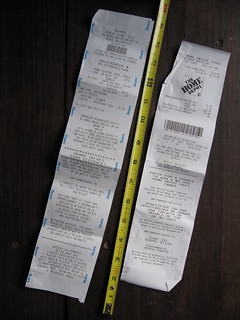 |
| Photo by haansgruber via Flickr |
Were you one of the thousands of concerned North Carolinians who read about House Bill 379 and contacted Agriculture Commissioner Steve Troxler recently?
House Bill 379, An Act To Clarify The Authority Of The Board Of Agriculture Over Plants would strip authority away from local governments to regulate plants. Why? Because back in 2004, three California counties passed local ordinances banning the cultivation of genetically-modified organisms (GMOs). That act set off a wave of "pre-emption" bills across the country, as the multinational corporations who sell GMO seeds to farmers sought to make sure that the movement to ban GMOs never left California.
We've been calling H 379 a zombie bill, because it returned from the dead after an unsuccessful effort to pass it back in 2005. If you emailed Commissioner Troxler, you probably got a response back recently that says:
"Some of the information you have received from Toxic Free NC about this bill is not correct. We support and promote small farms and organic growers, and there is nothing in this bill that would harm organic growers or small farms."
The good folks at the Department of Agriculture are clearly interpreting the language in this bill differently than we are. That's understandable -- it's a very short bill, with very broad language. They don't see any reason for small farmers or organic farmers to be concerned about harms. Did they ask any?
Here's what Jamie Ager of Hickory Nut Gap Farm near Asheville had to say about the bill in a recent news story:
"Stay out of the way," he [Ager] warned. "You know, we don't need more regulatory burden on creating a food system that consumers are demanding." Ager is worried that H 379 is a tool to increase the level of control that a small number of multinational corporate seed and chemical companies already exert over our food supply. We think he's exactly right.
Troxler's email goes on to say:
"In North Carolina, farmers have chosen to plant nearly three million acres of crops produced from seed that would be considered “genetically-modified”. That includes 96 percent of all cotton, 93 percent of all soybeans, and 85 percent of all corn."
Wow. That's a lot of genetically-modified crops. Whatever your position on genetically-modified crops, it would be imprudent for local governments in North Carolina to try to prohibit farmers from growing them (which is probably why none of them ever have, to the best of our knowledge). Toxic Free NC has certainly never encouraged a local government to do so, and has no plans to try. Yet the Department of Agriculture's staff stated in legislative hearings in 2005 (when this same bill was first filed) that the bill came about because of the GMO ban in Mendocino, California, and was intended to prevent North Carolina's local governments from ever doing the same. This is a solution in search of a problem.
Growing a strong, vibrant organic agriculture sector in North Carolina depends on protecting the organic certification of our farmers. Anything that puts that certification at risk - including contamination from GMO crops, and pesticide drift from neighboring farms, for example - is a risk that should be taken seriously. Filing a bill like H 379, and then dismissing valid criticisms, shows just how little heed the NC Department of Agriculture pays those risks - particularly when lobbyists from the likes of Monsanto show up asking for a favor.
Meanwhile, in our state legislative efforts are also underway to eliminate the NC Sustainable Local Food Advisory Council, ensure that farmers don't necessarily have to pay fines when they violate pesticide regulations, and eliminate or slash funding from state programs that have benefited small, local farmers, such as the Golden LEAF Foundation and the NC Tobacco Trust Fund. H 379 is certainly not the only example of the NC Department of Agriculture's legislative agenda leaving sustainable and organic farmers out in the cold. It's just the one that got a lot of attention because we used a picture of a zombie in the action alert.
I'm glad we got your attention, Commissioner Troxler. Now please explain to us why on earth this bill is needed, and how you plan to make sure that organic and sustainable farmers are not harmed by it?
Update:
H 379 passed the NC House on April 30, with a vote of 93-23. See how your Representative voted here. A companion bill, S 639, has already passed the Senate. We expect the two versions to be reconciled soon and sent to Governor McCrory for his signature.
Update:
H 379 passed the NC House on April 30, with a vote of 93-23. See how your Representative voted here. A companion bill, S 639, has already passed the Senate. We expect the two versions to be reconciled soon and sent to Governor McCrory for his signature.



